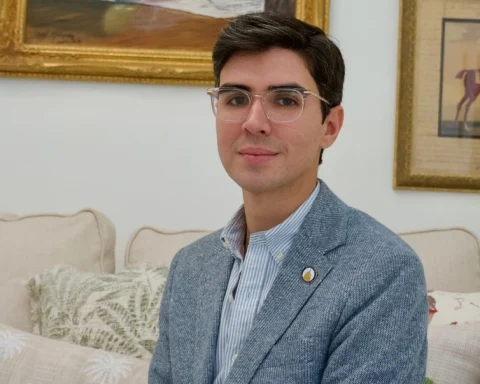JW Verret has a plan for his heirs when he dies. And it’s unlike anything estate planners might have envisioned a decade ago. And it is that this middle-aged law professor has spent two years accumulating several cryptocurrencies. To access that wealth, should it come to an untimely end, your three children might have to read a 25-page document detailing the websites to navigate, the special wallets to download, the apps websites to connect to and the bags to cover.
(The warnings that the founder of Ethereum made of crypto assets).
“I tried to give the instructions as best I could, have the websites and warn them about everything,” said Verrett, an associate professor at George Mason University School of Law. “But it’s quite possible that, either because of user error or lack of knowledge or because things change, they need expert help.” Verret’s treasure hunt document may seem like an unusual challenge for an asset class that has become a nearly $2 trillion market.
But he underlines that, despite all the wealth accumulated in the world of digital tokens in recent years, the best way to pass it on to the next generation is still a big puzzleeven for the usual experts.
In 2021, investors placed more than $25 billion into cryptocurrency startups and non-fungible tokens, a 700% increase from the previous year, according to data provider CB Insights. Digital assets are becoming more mainstream, and Fidelity Investments recently launched a product that will allow 401(k) plan participants to put a portion of their savings into bitcoin.
(Moody’s downgrades debt from El Salvador, a country where bitcoin is legal).
However, as more cryptocurrency holders need help structure your estate, the serious world of estate planning is still trying to catch up. Pundits remain few and far between for an asset beset by volatility and at risk of being lost forever.
what wallet? Those who are making inroads run into other obstacles. Charles Kolstad, who has 42 years of experience in the wealth planning industry, now runs a cryptocurrency practice group as a partner at Withers. The law firm has represented founders of cryptocurrency exchanges and companies, issuers of tokens, and artists who coin TNFs, which are digital certificates of content authenticity. And it has had to convince cryptocurrency holders, whose natural instinct is keep your wealth anonymous and protected, to share basic details.
The challenge is “getting them to tell you all the crypto they have and where it is, and what wallet is it in? Is it a hot wallet? Is it a cold wallet? Is it in an exchange? Is there multiple exchanges?” says Kolstad. , 68, who lives in Los Angeles. (A hot wallet is connected to the internet for transactions, while a cold one keeps cryptocurrencies offline.)
(Panama approves law to regulate cryptocurrencies).
Fortunes Built With Cryptocurrencies Are More Volatile Than Anything Wealth Planners Have Ever Seen. Bitcoin and ether are down 40% from their November highs and are trading below their one-year average. Those kinds of swings make cryptocurrency holding unpleasant for trustees, the typical ones responsible for estate planning.
They are required to maintain a broadly diversified portfolio of assets in the interest of the beneficiaries. HODL Mindset Trustees “know very little, most of them, about crypto, and their natural inclination would be to sell, sell, sell,” Kolstad said. Selling, of course, is anathema in the cryptocurrency world, which preaches HODL, an acronym for “hold on for your life.”
So companies have advised customers to use directed trusts or put their shares in limited liability companiesor LLC, which in turn are put into trusts.
Both options give someone other than the trustee control over the management of the investments. Wyoming is becoming a popular location for trusts holding crypto, according to Jonathan Mintz, founding partner of Evergreen Legacy Planning. The state has no income tax and allows the formation of directed trusts.
In some cases, large cryptocurrency holders have even created their own private trust companies, allowing them to maintain greater control and custody over assets, said Chris Duncan, an attorney with Carey Olsen’s private equity and trust practice in the US. Cayman Islands. For clients who hold a dizzying array of private portfolios of esoteric assets in exclusive custody, attorneys like Duncan have had to write special provisions.
In a recent case, I had a client who held assets on behalf of his trust and required trustee approval to transact. The Caiman team put together a scenario for a “black swan” event. ‘Fatal mistake’ “What if something happens that none of us anticipated?” Duncan said. “The client is in London, let’s say, and the trustee is in Cayman and there is a difference of five or six hours.
The trustees are in bed and the client sees some announcement on Twitter about a fatal code flaw in some project and has a chance to get out.” response from the Cayman Islands trustee within a specified period of time.
“You have to compensate for the fact that maintain assets in a way that allows you to do many things with them very, very quickly, whether it’s farming the yield, doing DeFi or buying NFTs,” said Geoff Costeloe, an associate at Lindsey MacCarthy in Canada. “You have to trade between that and a system that’s set up to distribute it to your beneficiaries in case die.” Most cryptocurrency holders may only need the basics: a way to share keys with beneficiaries at some point in the future, and a set of instructions they must follow to move the cryptocurrency at that time.
There are more and more solutions on the market that allow secure key sharing, such as multisig technology from companies like Casa and Unchained Capital. Multisig wallets require multiple approvals before transactions can take place. Costeloe recommends using these services in conjunction with an attorney and an estate plan.
As for Verret and his 25-page document, he has been teaching his three children, all under 10, to use wallets by putting his allowance in them. Her instructions clearly indicate that her heirs should never share their seed phrase with anyone, or the cryptocurrencies could be lost forever. Like others in the crypto world, he is wary of any talk of his holdings. “In our last half hour, no offense, I thought he was trying to steal my money,” Verret said.
AFP

















